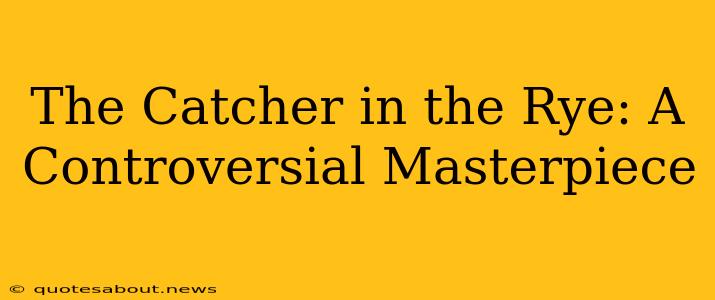J.D. Salinger's The Catcher in the Rye, first published in 1951, remains a hotly debated literary work. Its enduring popularity is matched only by its consistent presence on banned books lists, a testament to its controversial themes and unflinching portrayal of teenage angst. This essay will delve into the reasons behind its enduring controversy, exploring its impact on readers and its lasting legacy in literature.
Why is The Catcher in the Rye so Controversial?
The novel's controversial nature stems from its frank depiction of adolescent alienation, rebellion, and sexual exploration. Holden Caulfield, the cynical and unreliable narrator, expresses disgust with the "phoniness" of the adult world, using profanity and engaging in activities considered inappropriate for his age. This raw honesty, while resonating deeply with many teenagers, has led to concerns about its influence on young readers. Some critics argue the book glorifies anti-social behavior and promotes cynicism, while others praise its authentic portrayal of teenage struggles.
What are the main themes in The Catcher in the Rye?
The novel explores several complex themes that contribute to its enduring relevance. Alienation and loneliness are central to Holden's experience, reflecting the anxieties and uncertainties of adolescence. His search for authenticity in a world he perceives as superficial is a recurring motif, as is his struggle with grief and loss, particularly the death of his younger brother Allie. Holden's cynicism and rebellious behavior are also manifestations of his deeper emotional vulnerability and desire for genuine connection. Finally, the novel touches upon themes of mental health, with Holden's experiences hinting at possible depression and anxiety.
What is the significance of the title The Catcher in the Rye?
The title itself is symbolic, referencing Holden's fantasized role as a "catcher in the rye," preventing children from falling off a cliff into adulthood. This represents his idealistic desire to protect innocence and shield children from the harsh realities of the adult world. However, the inherent impossibility of this role highlights the limitations of his own understanding and the complexities of growing up.
Is The Catcher in the Rye suitable for teenagers?
The suitability of The Catcher in the Rye for teenagers is a matter of ongoing debate. While its unflinching portrayal of adolescent experiences can resonate powerfully with young readers, its language and themes may be considered inappropriate for some. Parental guidance and open discussion are crucial when considering its suitability for specific individuals. The book's controversial aspects should not overshadow its potential to spark important conversations about adolescence, mental health, and societal pressures.
What makes The Catcher in the Rye a literary masterpiece?
Despite its controversy, The Catcher in the Rye remains a literary masterpiece due to Salinger's masterful use of first-person narration. Holden's voice is authentic and compelling, drawing readers into his world and allowing them to experience his emotional turmoil firsthand. The novel's deceptively simple prose belies its complex exploration of universal themes, making it relatable across generations. Its enduring impact on literature and popular culture further solidifies its position as a significant work.
The Lasting Legacy of The Catcher in the Rye
The Catcher in the Rye continues to inspire discussions and interpretations, influencing countless works of literature and film. Its impact extends beyond the literary world, shaping how we understand and portray adolescence in popular culture. The novel's enduring relevance lies in its ability to tap into the universal experiences of alienation, loss, and the search for meaning, making it a timeless exploration of the human condition. While its controversial aspects remain a subject of debate, its literary merit and cultural impact are undeniable.

